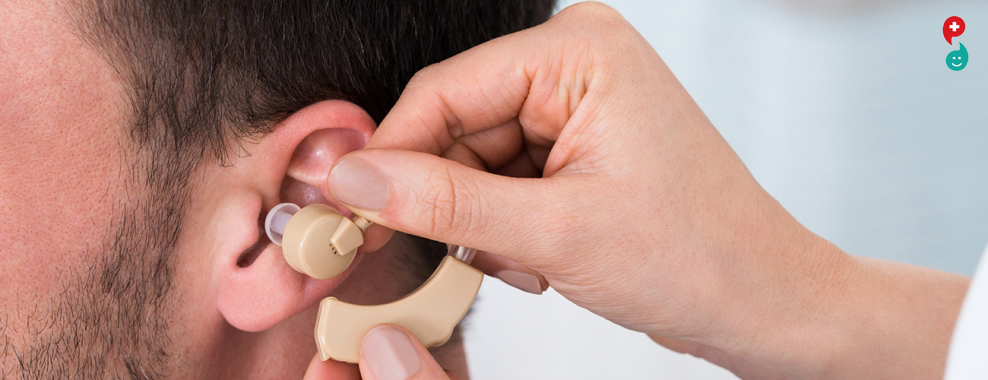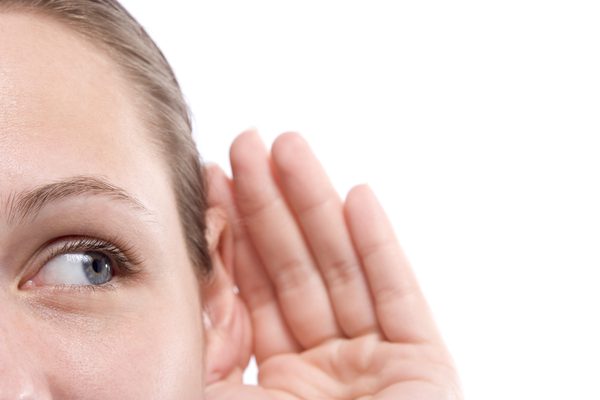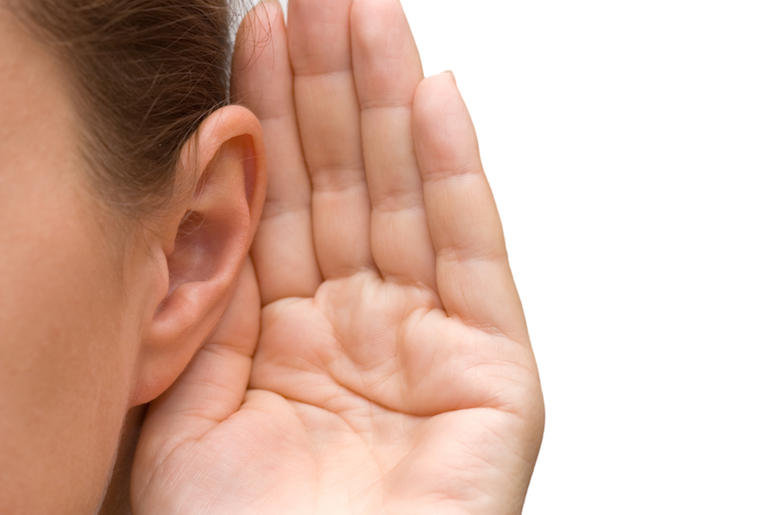Overview
Hearing loss that occurs gradually as you age (presbycusis) is common. About one-third of people in the United States between the ages of 65 and 75 have some degree of hearing loss. For those older than 75, that number is approximately 1 in 2.
Hearing loss is defined as one of three types:
Conductive (involves outer or middle ear)
Sensorineural (involves inner ear)
Mixed (combination of the two)
Aging and chronic exposure to loud noises both contribute to hearing loss. Other factors, such as excessive earwax, can temporarily reduce how well your ears conduct sounds.
You can't reverse most types of hearing loss. However, you and your doctor or a hearing specialist can take steps to improve what you hear.
Symptoms
Signs and symptoms of hearing loss may include:
Muffling of speech and other sounds
Difficulty understanding words, especially against background noise or in a crowd
Trouble hearing consonants
Frequently asking others to speak more slowly, clearly and loudly
Needing to turn up the volume of the television or radio
Withdrawal from conversations
Avoidance of some social settings
When to see a doctor
If you have a sudden loss of hearing, particularly in one ear, seek immediate medical attention.
Talk to your doctor if difficulty hearing is interfering with your daily life. Age-related hearing loss occurs gradually, so you may not notice it at first.
Causes
To understand how hearing loss occurs, it can be helpful to first understand how you hear.
How you hear
Your ear consists of three major areas: outer ear, middle ear and inner ear. Sound waves pass through the outer ear and cause vibrations at the eardrum. The eardrum and three small bones of the middle ear amplify the vibrations as they travel to the inner ear. There, the vibrations pass through fluid in a snail-shaped structure in the inner ear (cochlea).
Attached to nerve cells in the cochlea are thousands of tiny hairs that help translate sound vibrations into electrical signals that are transmitted to your brain. Your brain turns these signals into sound.
How hearing loss can occur
Causes of hearing loss include:
Damage to the inner ear. Aging and exposure to loud noise may cause wear and tear on the hairs or nerve cells in the cochlea that send sound signals to the brain. When these hairs or nerve cells are damaged or missing, electrical signals aren't transmitted as efficiently, and hearing loss occurs.
Higher pitched tones may become muffled to you. It may become difficult for you to pick out words against background noise.
Gradual buildup of earwax. Earwax can block the ear canal and prevent conduction of sound waves. Earwax removal can help restore your hearing.
Ear infection and abnormal bone growths or tumors. In the outer or middle ear, any of these can cause hearing loss.
Ruptured eardrum (tympanic membrane perforation). Loud blasts of noise, sudden changes in pressure, poking your eardrum with an object and infection can cause your eardrum to rupture and affect your hearing.
Risk factors
Factors that may damage or lead to loss of the hairs and nerve cells in your inner ear include:
Aging. Degeneration of inner ear structures occurs over time.
Loud noise. Exposure to loud sounds can damage the cells of your inner ear. Damage can occur with long-term exposure to loud noises, or from a short blast of noise, such as from a gunshot.
Heredity. Your genetic makeup may make you more susceptible to ear damage from sound or deterioration from aging.
Occupational noises. Jobs where loud noise is a regular part of the working environment, such as farming, construction or factory work, can lead to damage inside your ear.
Recreational noises. Exposure to explosive noises, such as from firearms and jet engines, can cause immediate, permanent hearing loss. Other recreational activities with dangerously high noise levels include snowmobiling, motorcycling, carpentry or listening to loud music.
Some medications. Drugs such as the antibiotic gentamicin, sildenafil (Viagra) and certain chemotherapy drugs, can damage the inner ear. Temporary effects on your hearing — ringing in the ear (tinnitus) or hearing loss — can occur if you take very high doses of aspirin, other pain relievers, antimalarial drugs or loop diuretics.
Some illnesses. Diseases or illnesses that result in high fever, such as meningitis, may damage the cochlea.
A woman's body is very complex. It goes through a lot of changes over its lifetime, especially once the child bearing days are over. This is when a woman hits menopause. Besides not getting periods, there are various other hormonal changes that takes place in the body, which are also linked to a variety of health problems, especially hot flashes. Hot flashes are characterised by intense heat, rapid heartbeat, and sweating, and each occurrence may last as long as thirty minutes. The cause of hot flashes is linked with the decreased levels of oestrogen in the body as a result of menopause. When the body doesn't have as much oestrogen, it effects the ability of the hypothalmus to regulate body temperature.
These changes can leave a lot of women confused as to how to monitor their health, and since hormone therapy is the most common treatment, a lot of women turn to that. Hormone replacement therapy - medications containing female hormones to replace the ones the body no longer makes after menopause - is a standard treatment for women with hot flashes and other menopause symptoms. However, it is now being touted to cause serious health issues.
Hearing loss, which is one of the main problems that women turn to hormone replacement therapy for, is actually aggravated by this therapy, a new study suggests. HRT is supposed to replace the oestrogen in the body and hence, help in reducing hearing loss, but the new research shows otherwise.
"Although the role of sex hormones in hearing is complex and incompletely understood, these findings suggest that women who undergo natural menopause at an older age may have a higher risk," said lead author of the study Sharon Curhan from Brigham and Women's Hospital in Boston, Massachusetts, US.
"In addition, longer duration of postmenopausal hormone therapy use is associated with higher risk. These findings suggest that hearing health may be a consideration for women when evaluating the risks and benefits of hormone therapy," Curhan said.
To investigate the role of menopause and postmenopausal hormone therapy as risk factors for hearing loss, the researchers prospectively examined the independent links between menopausal status, oral hormone therapy, and risk of self-reported hearing loss in 80,972 women in the Nurses' Health Study II followed from 1991-2013.
During the study period, 23 per cent of the participants developed hearing loss. However, women can get rid of these symptoms even without choosing to go for hormone replacement therapy by making a few changes in their lifestyle.
There is some evidence that healthy lifestyle behaviours can improve some symptoms of the menopause - for example, hot flashes and night sweats. In addition, weight loss, mindfulness and cognitive behavioural therapy can have also a mild-to-moderate effect on these symptoms. Some women may also experience that eating spicy foods, drinking, or smoking may aggravate the symptoms. Therefore, it is recommended for them to avoid these things.
Wearing lighter-weight clothes, sleeping in a cooler room, and reducing stress can also help women decrease the intensity and frequency of hot flashes.
A team of researchers have found a new method to fix cells inside the ear, which could help millions of people who suffer from hearing loss.The study conducted by researchers at University of Southern California (USC) in the US demonstrates a novel way for a drug to zero in on damaged nerves and cells deep inside the ear.
Researchers said, the new method is a potential remedy for a problem that afflicts two-thirds of people over 70 years and 17 per cent of all adults in the US.
Charles E McKenna, a professor at USC , said "What is new here is we figured out how to deliver a drug into the inner ear so it actually stays put and does what it is supposed to do, and that is novel."
"Inside this part of the ear, there is fluid constantly flowing that would sweep dissolved drugs away, but our new approach addresses that problem," said McKenna, lead author of the study.
He said,"This is a first for hearing loss and the ear. It is also important because it may be adaptable for other drugs that need to be applied within the inner ear."
The research was conducted on animal tissues in a petri dish. It has not yet been tested in living animals or humans.
Yet, the researchers are hopeful given the similarities of cells and mechanisms involved. McKenna said since the technique works in the laboratory, the findings provide "strong preliminary evidence" it could work in living creatures. They are already planning the next phase involving animals and hearing loss.
The finding breaks new ground because researchers developed a novel drug-delivery method.
Specifically, it targets the cochlea, a snail-like structure in the inner ear where sensitive cells convey sound to the brain.
Hearing loss occurs due to ageing, working with noisy machines and too many loud concerts.
Over time, hair-like sensory cells and bundles of neurons that transmit their vibrations break down, as do ribbon-like synapses, which connect the cells.
The study was published in the journal Bioconjugate Chemistry.

Eating healthy can do wonders for your weight loss goals, hair and skin. But its benefits go beyond that. A recent research has found that eating a healthy diet can reduce the risk of hearing loss by 30%.
In the study, researchers from Brigham and Women’s Hospital examined the relation between three different diets and risk of developing hearing loss: The Alternate Mediterranean diet (AMED), Dietary Approaches to Stop Hypertension (DASH), and the Alternative Healthy Eating Index-2010 (AHEI-2010). They followed 70,966 women for 22 years and found that eating a healthy diet is associated with a lower risk of acquired hearing loss in women.
“Interestingly, we observed that those following an overall healthy diet had a lower risk of moderate or worse hearing loss,” said Sharon Curhan, first author of the study. “Eating well contributes to overall good health, and it may also be helpful in reducing the risk of hearing loss.”
In this longitudinal study, researchers collected detailed information on dietary intake every four years and found that women whose diets most closely resembled the AMED or DASH dietary patterns had an approximately 30% lower risk of moderate or worse hearing loss, compared with women whose diets resembled these dietary patterns the least.
Moreover, findings in a sub-cohort of over 33,000 women for whom detailed hearing-related information had been collected suggest that the magnitude of the reduced risk may be even greater than 30%, and may also pertain to the AHEI-2010. The AMED diet includes extra virgin olive oil, grains, legumes, vegetables, fruits, nuts, fish and moderate intake of alcohol. The DASH diet is high in fruits and vegetables and low-fat dairy, and low in sodium. The AHEI-2010 diet has common components with AMED and DASH.
Smokers beware. You maybe at a higher risk of suffering hearing loss, as a new study suggests that smoking affects the ability to hear both high and low frequency sounds.
"These results provide strong evidence to support that smoking is a causal factor for hearing loss and emphasise the need for tobacco control to prevent or delay the development of hearing loss," said lead author Huanhuan Hu from the National Centre for Global Health and Medicine in Japan.
For the study, published in the journal Nicotine and Tobacco Research, researchers included 50,195 people, aged between 20 to 64 years and free of hearing loss. The researchers analysed data from annual health checkups, which included audio testing performed by a technician and a health-related lifestyle questionnaire completed by each participant.
They examined the effects of smoking status (current, former and never smokers), the number of cigarettes smoked per day, and the duration of smoking cessation on the extent of hearing loss. The participants were followed up for a maximum of eight years.
Even after adjusting for factors including occupational noise exposure, researchers noted a 1.2 to 1.6 increased risk of hearing loss among current smokers compared with never smokers.
During follow-up, 3,532 individuals developed high-frequency hearing loss, and 1,575 developed low-frequency hearing loss.
While the association between smoking and high frequency hearing loss was stronger than that of low frequency hearing loss, the risk of both high and low frequency hearing loss increased with cigarette consumption, the researcher said.
The increased risk of hearing loss decreased within five years after quitting smoking, the researcher added.
"With a large sample size, long follow-up period, and objective assessment of hearing loss, our study provides strong evidence that smoking is an independent risk factor of hearing loss," Hu said.












